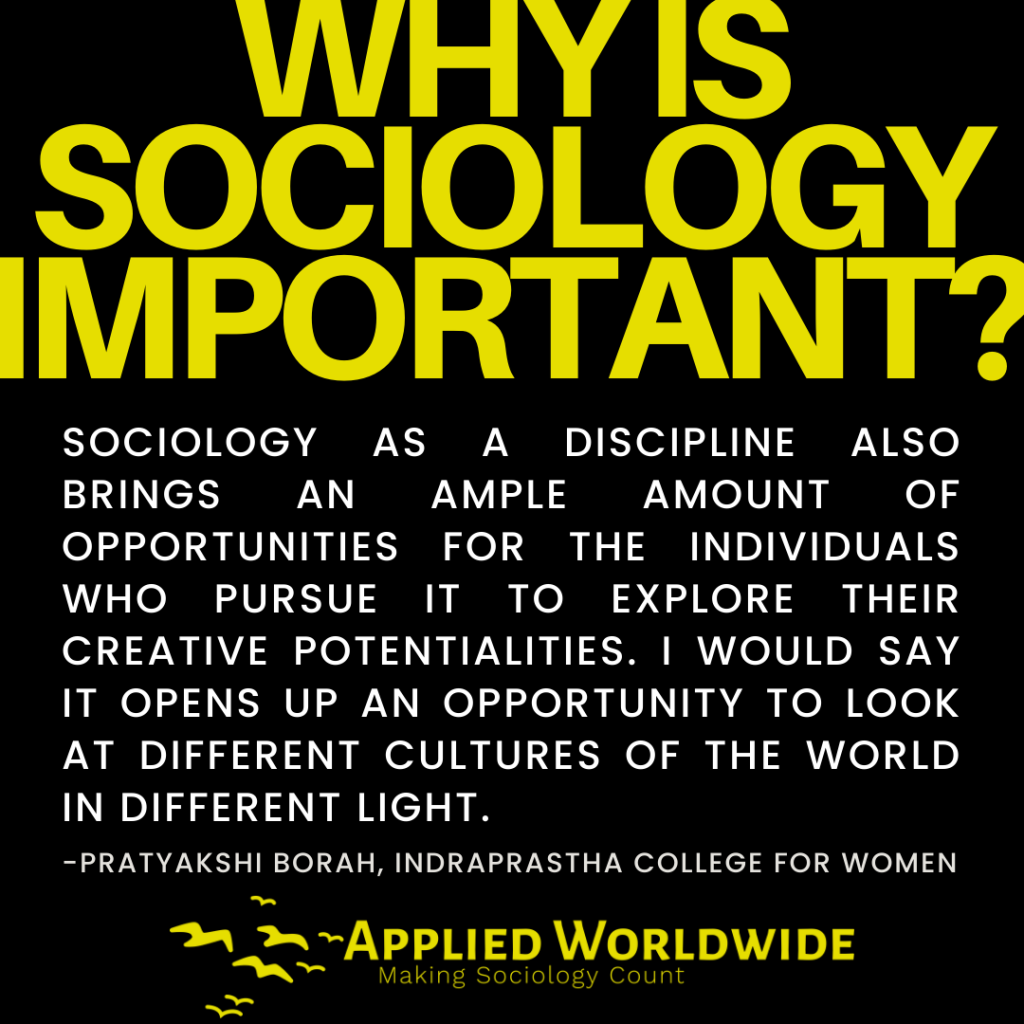Editorial Note
Thank you to our generous sponsors, Sociologists for Women in Society, Center for Equity Education, Azama Development Foundation, and Sociological Practice & Public Sociology (SPPS) – American Sociological Association (ASA) for helping us make Applied Worldwide’s 2023 “Why is Sociology Important?” student essay competition a success!
This essay on the importance of sociology was published on behalf of Applied Worldwide’s 2023 Global Student Essay Competition. For the 2023 competition, we awarded 16 student essayists across eight countries and one US territory and will be sharing each winning essay in our “Why is Sociology Important?” essay collection.
This sociology essay was written by Pratyakshi Borah, a third year sociology honors student at Indraprastha College for Women, University of Delhi in India and earned a 3rd place prize in the competition.
Why is Sociology Important?, Pratyakshi Borah
Being always a curious individual had always made me question things ever since I was a toddler. I took up Sociology for my undergrad degree and found myself to be thoroughly enjoying this discipline. I feel Sociology as a discipline, although very new compared to other fields, has made significant contributions on its own over the years.
Firstly, discipline often helps us to look at the most trivial things in an auspicious way. For instance, I would like to give the example of skin care that is very popular among young women to maintain their youthful look for a long time but this idea of maintaining beauty is often associated with the idea of gentility where women’s worth since time immemorial had been just reduced to their looks. This shows how these ideas are often ingrained within our minds even though we might not be consciously aware about it.
Secondly, I feel Sociology as a discipline also helps in bringing a lot of positive changes in people’s lives. I would cite my own experience here. I would say my seventeen year old self would be astonished with how the twenty year old me approaches things. For instance, three years ago I often held certain ideologies that I considered not necessarily problematic but I would say unacceptable. I hold certain notions that I felt should be followed by everyone rigorously regardless of what the circumstances are. Now, after being trained in this discipline for quite some time, I would say I have started respecting everyone’s boundaries. I had realised to respect others’ decisions and also be accepting of their choices. I had become a firm believer that everything has a particular reason behind it.
I also believe Sociology as a discipline also brings an ample amount of opportunities for the individuals who pursue it to explore their creative potentialities. I would say it opens up an opportunity to look at different cultures of the world in different light. I myself have a dream of carrying out a research paper outside my residence and do a rigorous field study.

Sociology as a discipline also looks at in depth analysis in various topics that are often ignored in the mainstream community. For instance, take the example of incest that is often seen as a tabooed topic in the mainstream culture. But Sociology often helps us in knowing about those communities where incest is normalised and is often practiced as a culture.
Sociology also helps in questioning the importance of gender inequality and how far have we come in overcoming the issues related to gender in today’s age. For instance, take the example of how men are often not hesitant to approach an unknown woman to ask their number or Instagram Id. But if a woman goes and asks for the number from the opposite gender she is often met with side eyes from others around her or in some circumstances would often be shamed for it. This is something which I am speaking on behalf of my culture (Indian context). I am not generalising it for every culture.
I would say in my last three years of learning Sociology, I have become more understanding of people’s experiences and decisions. I had also noticed how certain things are meant to be a certain way. For instance, I don’t want to be tagged as an ‘eavesdropper ‘ but while writing this essay, I am listening to the talks of my two Nepali roommates where one of them is unwilling to share about the stress that she had been going through last week. This makes me question if it is coming from her culture or the way she was socialised of not sharing her problems and keeping it to herself.
Sociology as a discipline also helps in providing opportunities in different lucrative sectors like health, criminology, probation etc. The research methodologies within the discipline often helps an individual in getting exposure to different experiences. Even though research as a field involves rigorous training methods and often requires time, effort and resources to produce an efficient piece of work, at the same time it helps an individual in learning a lot of new things and also comes out of their comfort zone.
I feel it also helps an individual be his/her own voice. For instance, being an academic oriented student since her middle school years had often made me act submissive to the existing norms. I hardly questioned anything that was problematic if it had to be followed as a norm. But now, I know my worth as an individual and often try to take my own stand if I find anything that goes against my morality or something that I find justifiable. I also feel I had started holding my own ground .
Overall, I feel Sociology as a discipline is very lucrative and also helps in the overall development of an individual as a person. I feel it helps us being an awakened individual in the society and how we can be aware about those things that might seem like a shuttle but might have bigger connotations attached to it. For instance, I would give the example of a cultural function that takes place every year in my locality. Here, singers are invited to perform their songs. But oftentimes, I have noticed that the female singers are the ones who end up performing at the end. This often leaves them with little time to show their talents as most of the time is often taken by the male singers.
I feel Sociology as a discipline had also made me accept different cultures. For instance, I come from a small town in Assam which is more of a collective space where people maintain intimate bonds with each other and often try to be a part of each other’s sorrows and joys. But when I had to leave for my undergraduate degree to a completely new environment, New Delhi which is a metropolitan area, I realised the importance of privacy. Here, every individual tries to maintain their individuality and everyone minds their own business.
Now, I would say my long term goal is to get a PhD in Sociology by publishing my own research thesis. I would love to carry out research outside of my native country, probably in the States. And I hope to work for a renowned company and contribute to the community.
I believe Sociology would provide me with a meaningful platform to explore my potential and my creativity. My favourite piece of reading in my three years of Undergraduation would have to be Janet Carsten’s reading on Malay households. Here, the author describes how a child is related to a particular household through blood, milk and food. Moreover, if a child consumes anything outside of his own native home she would often be considered to be a daughter of that particular household and cannot have any romantic relationship with the son of that household.
I would say I am still at the beginning stage and still have a lot of things to learn and unlearn in this discipline . I am also aware about the challenges that I may have to face as a young budding female researcher. But I am sure with my strong will power and determination to learn I would be able to achieve success.
Meet our 2023 Global Student Essay Competition Sponsors!

Sociologists for Women in Society is a nonprofit professional feminist organization dedicated to:
- Encouraging the development of sociological feminist theory and scholarship
- Transforming the academy through feminist leadership, career development, and institutional diversity
- Promoting social justice through local, national, and international activism
- Supporting the publication and dissemination of cutting edge feminist social science

The Center for Equity Education is a 501c3 nonprofit dedicated to providing quality and affordable DEI&A, discrimination, harassment, and sexual harassment prevention and education services.

Azama Development Foundation is a Non-governmental organization that actively works towards the development of youths and women to be self-reliant and productive. Our mission is to transform the lives of youths and women from all over Africa to be self-reliant and productive actively contributing to national economy, education and development, thereby eradicating poverty, illiteracy and lack of enlightenment in the region.

Sociological Practice & Public Sociology (SPPS) promotes the use of sociology to inform research, practice, and public policy beyond academia. In short, we focus on Making Sociology Actionable. SPPS focuses on public and applied sociology as a section under the American Sociological Association (ASA).








